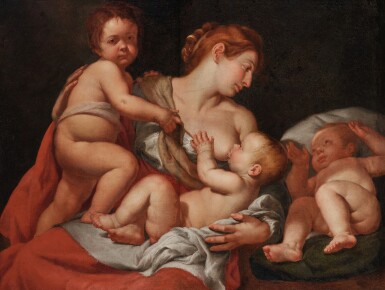Master Paintings Part II
Master Paintings Part II

Venetian School, circa 1700
Allegory of Charity
Estimate
40,000 - 60,000 USD
Lot Details
Description
Venetian School, circa 1700
Allegory of Charity
oil on canvas
canvas: 38 ½ by 51 ¼ in.; 97.8 by 130.1 cm
framed: 49 ⅜ by 62 ½ in.; 125.4 by 158.7 cm
Anonymous sale ("Property of a Private Collector"), New York, Sotheby's, 11 January 1990, lot 72 (as Venetian School, circa 1650/Follower of Bernardo Strozzi);
Where acquired by A. Alfred Taubman, Bloomfield Hills, Michigan;
By whom sold ("The Collection Of A. Alfred Taubman: Old Masters"), New York, Sotheby's, 27 January 2016, lot 37 (as Venetian School, circa 1700);
Where acquired by the present collector.
Detroit Institute of Arts, 1990 - 1992, long-term loan (inv. no. T1990.274)
This beautifully modeled and highly intimate Allegory of Charity is clearly a work a work of high quality, albeit one whose definitive attribution has thus far eluded scholars. Though influences from Genoese painters such as Domenico Piola and above all Bernardo Strozzi are apparent, the coloration and palette would suggest a Venetian painter from circa 1700 as the closest source. A suggested attribution to the Dalmatian-born Antonio Bellucci, an internationally active artist who settled in Venice by circa 1675. Bellucci is a key figure in Venice at this time as he served as a bridge between the Venetian late Baroque and the lighter, brighter palette of the 18th century, all while still infusing his large scale commissions with the bold coloring of his Venetian forebears Veronese and Titian. It is through that lens that a greater understanding of this canvas can be achieved, especially when compared with certain large scale commissions by Bellucci from around this same moment, such as his Antiochus and Stratonice from 1700 (Kassel, Staatliche Museen). Alternatively, Dottore Giuseppe Porzio has proposed an attribution to the the Neapolitan artist Cesare Fracanzano (circa 1605 - 1652), whose large canvas depicting a nursing mother in the Kunsthistorisches Museum, Vienna (inv. no. GG 1685) is comparable to the present work.
You May Also Like










